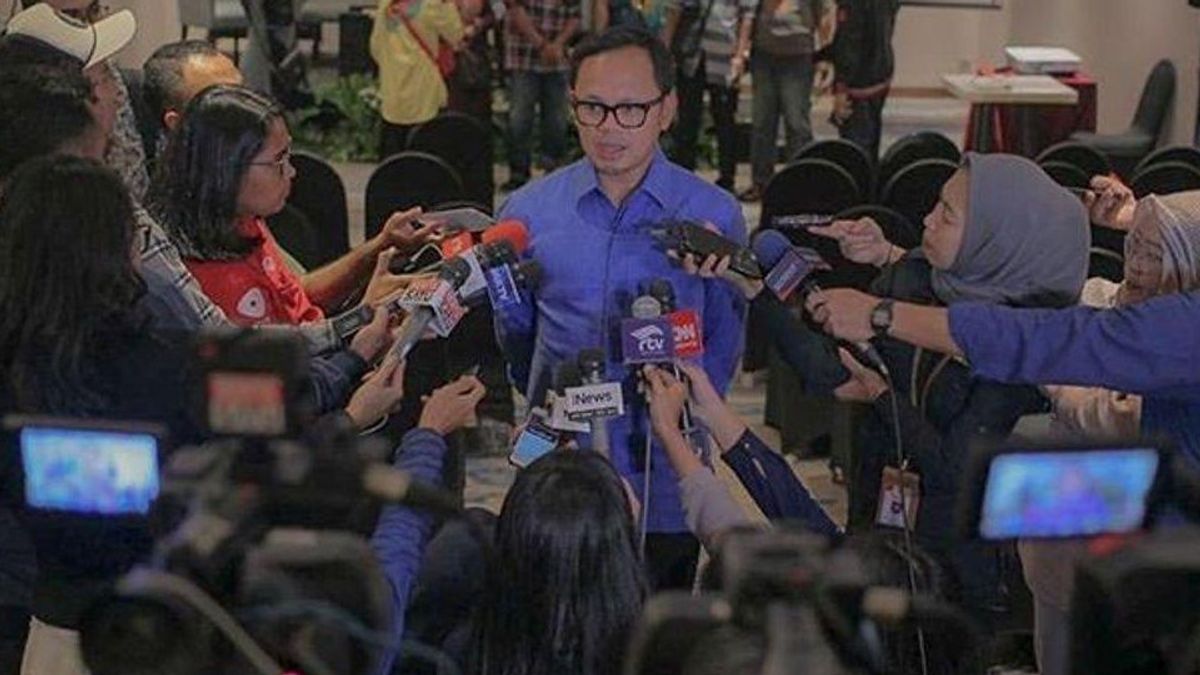JAKARTA - The synergy between local governments in dealing with the COVID-19 pandemic is awaited again. This afternoon, a number of regional heads in Jabodetabek held a meeting to discuss the optimization of the PSBB policy which DKI Jakarta will again implement. Unfortunately, the smell of political conflict glorification emerged. Things that should be avoided. There are many reasons why the synergy between local governments should be maintained. One of them, because the central government is no longer reliable.
Starting Monday, September 14, Jakarta will again implement large-scale social restrictions (PSBB). DKI Jakarta Governor Anies Baswedan mentioned three reasons for the decision. The three reasons that Anies meant were numerical parameters that showed how worrying the rate of transmission of the corona virus was in the Capital City.
"From three data, namely the mortality rate, use of isolation beds, use of the special ICU for COVID-19, it shows that the plague situation in Jakarta is in an emergency," said Anies at DKI City Hall, Central Jakarta, Monday, September 9.
Regarding the mortality rate, DKI recorded an average of up to 2.7 percent. Even though it is lower than the national death rate which reached 4.1 percent and globally, which is around 3.3 percent, in absolute terms the number of Jakarta case fatality rates continues to increase.

"The death rate from mid-August to September shows an increasing trend. This is a very unhappy condition. This has made the number of burials using COVID-19 procedures also increase," explained Anies.
The second reason is the use of COVID-19 treatment beds. The DKI Provincial Government is concerned that the increase in cases cannot be matched by medical treatment capacity. The DKI Provincial Government even said, with the rate of increasing cases and without increasing the capacity of isolation beds, Jakarta will no longer be able to accommodate COVID-19 patients on 17 September.
Third, the use of an ICU bed for COVID-19 patients with severe symptoms. According to the calculations of the DKI Provincial Government, if the number is not added, the ICU beds will no longer be able to accommodate patients on September 15.
"In the short term, we will increase capacity. But, if there are no strict restrictions, then this is just buying time. In less than a month, the hospital will be full again," said Anies.
Local government is hopeA report circulating on Friday afternoon, September 11 gave hope. When DKI Jakarta Governor Anies and a number of regional heads in Bodetabek, including West Java Governor Ridwan Kamil and Bogor Mayor, Bima Arya, held a meeting. This synergy is needed. A survey called the handling of the pandemic by the local government better than the central government.
The survey conducted by Indonesian Political Indicators collected respondents' assessments regarding the comparison of the handling of COVID-19 by local and central governments. As a result, only 36.8 percent of the elite group rated the central government's performance as good or very good in dealing with the corona virus outbreak. Meanwhile, 28 percent of respondents considered it normal. The rest, 34.9 percent even rated the handling of COVID-19 by the central government as bad or very bad.
IPI Executive Director Burhanuddin Muhtadi said the score was lower than the elite group's assessment regarding the handling of the pandemic by the provincial government (pemprov) which reached a value of 49.1 percent. The number of respondents viewed the provincial government as good or very good at handling COVID-19. IPI involves specific groups in this survey. Burhanuddin explained that 304 respondents to the survey consisted of academics, mass media editors, health observers, professional organizations, and NGOs in 20 cities throughout Indonesia.

The explanation further details the logic from a research perspective. The provincial government is seen as more responsive and more sensitive to crises. The provincial government is also considered to have better communication closeness with the community. In addition, in coordinating the apparatus, the small scope of the provincial government is considered more effective and right on target.
"These are findings that I think are important for the central government. If asked now, the central government is under the provincial government according to the elite," he said, quoted from VOA Indonesia, Friday, September 11.
Public policy observer Agus Pambagio complements the views of this survey. He said, in ideal practice, the regional government would move with a command from the center. Local governments, however, can only move with the blessing of the central government. However, according to Agus, overlapping regulations at the central level often become an obstacle in local government policies.
"Now the regional government must follow all the regulations, which make up (rules) the central government. Only it complements the perda, with the regional head regulations. Now, the problem at the center is that the regulations overlap," said Agus to VOI, Friday, 9 September.
Political distractionThe comforting news about the Jabodetabek regional heads meeting on Friday afternoon turned out to be unpleasant. After the meeting, Bogor Mayor Bima Arya told the mass media that the PSBB policy being discussed in Jakarta was unclear. Bima Arya's statement was busy being discussed and became a trending topic on Twitter.
Political observer and Executive Director of the National Survey Media (MEDIAN), Rico Marbun, said Bima Arya should be able to restrain himself, avoiding statements that could cause political distraction. If you want to be kind, say that Bima Arya has no political intentions, but his statement has already rolled into a political matter. The synergy that should be built between regional heads is increasingly under threat. And Rico saw the role of the buzzer here.
"Should (regional heads) stop attacking each other. And in a stronger context, we have seen, for example, in East Java and Surabaya City. It doesn't repeat itself between DKI versus the surrounding areas," Rico told VOI, Friday, September 9.
"Buzzer doesn't have to be paid. There are also sympathizers. The silence of buzzer idols is a kind of letting go," added Rico.

Indeed, it is not easy to avoid politicization. In the situation leading up to the pilkada, especially. However, sanity must be maintained. The dimensions of the COVID-19 health crisis are too difficult. Adding political flavor would only make all the trouble worse. "The people who die," said Rico.
Moreover, on political counts, sparking the embers of conflict in the midst of a precarious situation has the potential to trigger antipathy against the names of regional heads. A bad situation as their political capital in the future. Fostering people's trust is important today. And it cannot be built through attacks on political rivals, let alone framing a pseudo-narrative through the deployment of buzzers.
"What can be done in the current context so that it does not become an arena for political competition, yes, every policy needs to be communicated openly (with) a scientific background. And each party must be able to reduce the supporting buzzers that will naturally fight each other on social media, "said Rico.
Now, with all the facts that regional heads play a vital role in handling the health crisis due to the COVID-19 pandemic, synergy must be strengthened. Regional heads must be able to move in the same rhythm. This does not mean applying the same policies, but to show that hope is still there.
"We recommend that the regional heads gather together, meet together and make a joint statement.
The English, Chinese, Japanese, Arabic, and French versions are automatically generated by the AI. So there may still be inaccuracies in translating, please always see Indonesian as our main language. (system supported by DigitalSiber.id)









